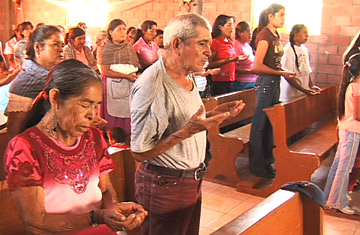
The village of La Heredad, Mexico.
Corn farmer Marcelo Perez thought his four sons had struck the jackpot a few years ago when they got jobs picking tobacco in Georgia and hauling breeze blocks in Florida. As each sent home up to $1,000 every month, the family began building a row of two-story brick houses on Perez's ancestral corn plots, spreading the wealth by using cheap labor and materials from their Hnahnu Indian village. Now, thought Perez, they could live like the other migrants, whose gated mansions towered above the corrugated-iron roofed shack in which he had raised his boys. But last year, the dream died, and the houses were left unfinished, with ragged piles of stones and bags of cement rotting under the hot Mexican sun. The flow of remittances from across the border had dried up amid the U.S. economic slowdown and a crackdown on illegal immigrants.
"They want to send money back but they just can't," says Perez. "There are no jobs, and when they do find vacancies, they get asked for papers. They are just scraping by with the odd day's work. They even asked about coming home. But I told them with all the deportees fighting for jobs here, there is nothing for them."
The tribulations of the Perez family reflect a wider reversal of fortune for Mexico's migrants, whose remittances provide the nation's second-largest source of foreign exchange after oil. Figures released by Mexico's Central Bank last month revealed that remittances had dropped for the first time since it began keeping records, down 2.2% for the first six months of the year. The bank blamed the slowdown in U.S. construction for the loss, saying that one fifth of Mexican migrants were in the building trade. A rise in deportations and security on the border have also contributed. Before 2006, migrants could work seasonal jobs in the U.S. and return to their villages with fistfuls of dollars; many migrants are now not risking the southbound trip or being thrown out penniless.
While 2% may seem a minimal drop, it has had dramatic effects in some communities. La Heredad, which has seen most of its young men head to "El Norte" since the late 1980s, migrant money provided the main source of income, building houses, the church, the basketball court and even the paved road that runs through the village. Now, residents complain they struggle to get by, chewing on the corn, beans and chilis from their arid land.
said the drop of remittances in some villages is closer to 50%. "You can see it everywhere," says Fernando Ramirez, head of the Supreme Hnahnu Council, which fights for Indian rights in the region. "There is no money to keep the kids in school, no money to keep a family warm. People are getting desperate and turning to crime, making the community more insecure."
One reason for the disproportionate impact is that migrants from the same Mexican town tend to establish themselves a new community in a single U.S. town or city, where they share houses and work side by side in the same fields, factories and food outlets. Most migrants from La Heredad have spent time in Clearwater, Florida, while in the neighboring village of Boye, almost everyone has been to Hickory, North Carolina. An immigration clampdown in one locale north on the border can thus have devastating effects on a single Mexican town.
Experts believe that the real fall in remittances affecting migrant communities is much higher than 2%, because a lot of the funds credited as migrant remittances are, in fact, transfers from unregistered businesses, including the drug trade.
"For a long time, we were seeing these huge numbers for remittances and we couldn't work out where it all went. It just didn't add up," said researcher Daniel Lund, who has investigated the issue for the United Nations. "The adverse effect in these communities reaffirms our suspicions. Half this money may not be remittances at all."
The dramatic loss of income to many Mexican towns has community leaders deeply concerned. Rep. Edmundo Ramirez, a federal deputy from La Heredad, is demanding that President Felipe Calderon pushes the United States for a new guest worker program. The issue had been a cornerstone policy of former President Vicente Fox, who addressed a joint session of the U.S. Congress to plead for a migrant accord in 2001. But after Fox's efforts failed, Calderon has moved more cautiously, focusing bilateral talks on security cooperation. However, Ramirez warned that if there is not renewed support for migrant villages, they could become a source of major social problems.
"Immigration to the United States has long been an escape valve, that has taken the air out of the growing population here," Ramirez said. "If that option disappears there will be unrest in the countryside. And the president will be forced to turn his attention to it."
